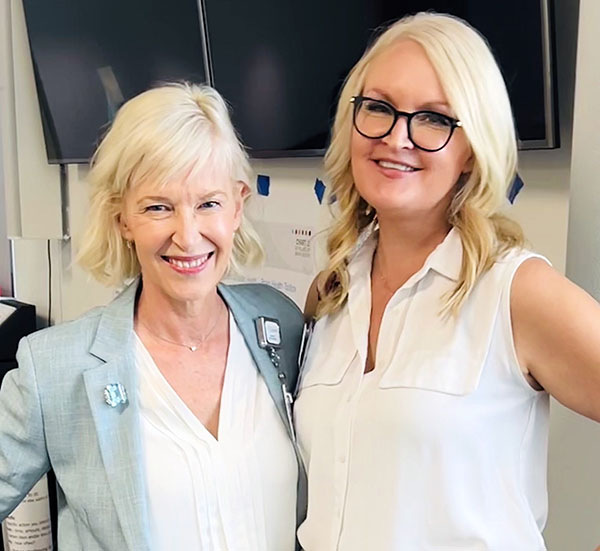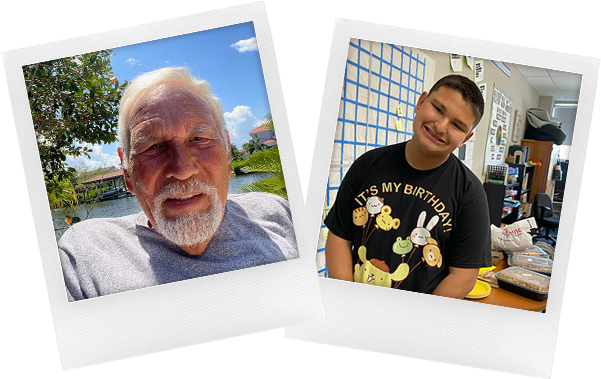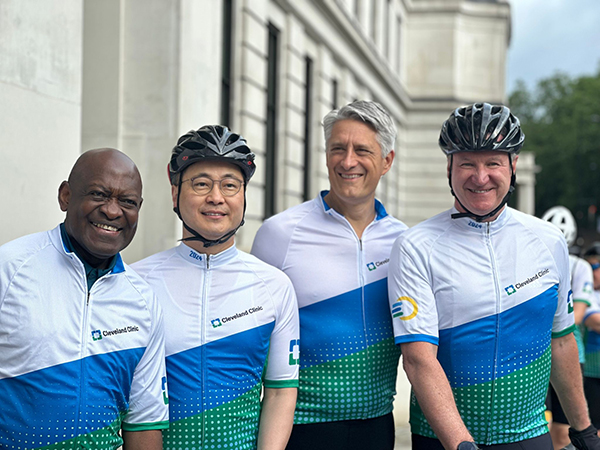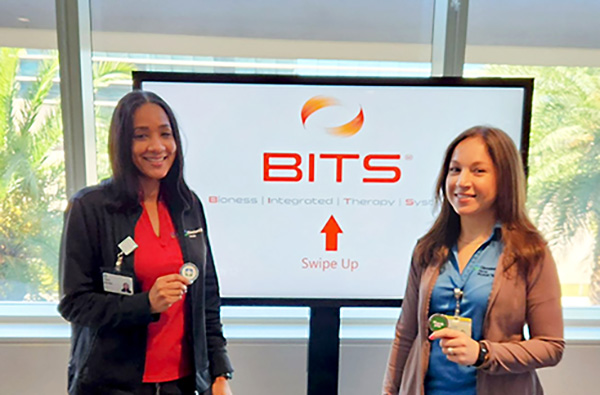Workshop Focuses on the 6 Pillars of Brain Health

A Cleveland Clinic caregiver is addressing the stigma surrounding dementia and educating patients on how to take care of neurodegenerative diseases before they start.
Dementia affects millions of people across the United States. It is the umbrella term for the many diseases that impact people’s thinking, memory and behavior, like Alzheimer’s disease.
About one in 16 people over the age of 65 have dementia with around half of people 85 years or older having some form of it. Alzheimer’s disease is the fifth leading cause of death in Americans aged 65 and older. Researchers believe dementia may start 10 years or more before patients show symptoms.
Kate Ingalsby, MEd, Program Manager, Cleveland Clinic Lou Ruvo Center for Brain Health in Las Vegas, says there is fear and even embarrassment around the diseases and most people don’t talk about them. After receiving a Cleveland Clinic Catalyst Grant, Ingalsby and her colleague, Katurah Hartley, BS Pharm, designed a community-based course to teach people about brain health.
Catalyst Grants are funded by thousands of gifts of all sizes from donors annually. The competitive grants are awarded to Cleveland Clinic caregivers with ideas to improve the lives of patients, the organization or communities around the world.
Their six-week program, the 6 Pillars of Brain Health, focuses on a different topic each week, including exercise, nutrition, medical health, sleep and relaxation, mental fitness and social interaction. Evidence shows that simple lifestyle modifications can help reduce the risks of memory and cognitive decline.
The 6 Pillars of Brain Health was born from a classroom assignment while Ingalsby was in the Master of Education in Health Professions Education (MEHPE) degree program, a collaboration between Cleveland State University and Cleveland Clinic.
The women have facilitated two evidence-informed workshops so far and impacted 34 participants from both rural and urban communities. They have also developed participant guides, leader manuals and measurable assessments. Their passion for educating patients about dementia is unwavering but additional philanthropy is needed to continue their efforts. “Educating people and putting that positive spin on the word dementia has been really helpful for our patients,” Ingalsby says.
A Special Gift from Florida Advances Autism Care in Cleveland

John Kovach was introduced to Cleveland Clinic at a young age – and in a rather unusual way. At the age of about 12, while watching TV, John felt some pain under his arm and discovered a lump in the area. His mother and, soon afterward, his primary care physician became immediately concerned John could have cancer.
“So my mother said, ‘We’d better go to the number one place, Cleveland Clinic,’” John remembered. But the lump, to everyone’s surprise and relief, turned out to be cat scratch fever, a disease caused by an uncommon bacterial infection originating from fleas that can occur when a cat scratches or bites a person. John’s infection was drained and the infection treated with an antibiotic.
“I supposedly had one of the first cases in northern Ohio or maybe even the United States,” John said, sharing that he used to spend a lot of time on a farm during his youth where he said his family experienced “invasions of cats.” According to the Centers for Disease Control and Prevention (CDC), cat scratch disease was documented in the 1930s, but the association of the illness with cats – and its etiologic agent, Bartonella henselae – wasn’t known until the 1950s.
John’s next encounter with Cleveland Clinic came decades later when he was diagnosed and treated for atrial fibrillation (AFib), an irregular heart rhythm that begins in the heart’s upper chambers (atria). John’s care was directed by Bruce Lindsey, MD, formerly head of the highly specialized Cardiac Electrophysiology and Pacing Section and member of Cleveland Clinic’s Multidisciplinary Center for Atrial Fibrillation. John ultimately underwent a successful ablation that destroyed the rhythm disturbance, and he has been able to manage his AFib since.
In addition to being grateful for his own care, John was impressed with how much Cleveland Clinic was able to help his wife’s father who suffered from diabetes, mentioning how serious his father-in-law’s disease was and how close he came to losing mobility and limbs.
Gratitude for Medical Innovation
John’s wife, Beverly Ann, formerly a Cleveland Clinic psychiatric care nurse – whom John met at a sock hop while attending John Carroll University (JCU) – always shared John’s awe and appreciation for medical innovation and exploration. It’s what motivated the couple, who relocated to Florida in 1984, to include Cleveland Clinic in their estate planning and become members of the Pyramid Legacy Society.
“I think Cleveland Clinic is a place that is always developing, always coming up with something new, something that hasn’t been tried before,” John said. “As a layman, I can’t talk specifics, but I just feel it.…”
A reluctant member of the JCU Football Hall of Fame (he insists others are more deserving), John completed two tours in Vietnam after college, marrying Beverly in between assignments. After a successful sales career in the trucking industry, he joined a family insurance business until, at the age of 50, he decided to pursue a master’s degree and a new career path in mental health counseling. In addition to serving as a counselor for nearly three decades, John has served for more than 20 years as volunteer for Kairos Prison Ministry International, Inc., a lay-led Christian ministry that helps prisoners and their families. Perhaps the only thing that surpasses John’s passion for his counseling is his devotion to his faith and to his family. At age 81, John is hugely proud of his children and grandchildren and is a devoted, nearly full-time caregiver to his bride of 57 years.
Honoring A Grandson By Helping Others
The Satellite Beach, Florida residents recently made a gift to Cleveland Clinic to honor of one of their five grandchildren, Jacob, who has autism. “Jacob is very intelligent and precise,” John shared. “And he loves airplanes. He can identify all the aircraft that land at SFO; EVA Air is his favorite.”
For Christmas, John sent Jacob a pair of binoculars so he could study the planes more closely. “He liked them so much he took them to bed with him,” John said, laughing. “Watching the planes in the air also provides a calming effect,” he explained.
As John and Beverly have experienced, the disease has far-reaching impacts. “I watch what my son goes through when he comes here to visit,” John shared. “You know, it’s one thing to care for an older person, but for the caregiver of a 13-year-old child with autism, it’s a whole different ballgame. It has an emotional effect on the whole family. “The parents take the brunt of it,” John said, but he worries about Jacob’s sister. “She plays a part (in her brother’s care). And at times I think it's too big a part, but that's what it is. She’s growing up fast.” He wishes they lived closer and could help more.
John and Beverly’s personal experiences with autism inspired them to make a gift to Cleveland Clinic Children's Center for Autism. Founded 20 years ago, the center offers comprehensive medical, surgical and rehabilitative care and fully integrated behavioral and speech/language therapy for infants, children and adolescents. More than 350 physicians accommodate more than 680,000 outpatient visits and 13,000 inpatient stays per year at main campus, Cleveland Clinic regional hospitals and other locations throughout Ohio. It further is a teaching and research center devoted to the development of novel treatments and assessment tools. The center has been expanding its outpatient services in recent years and will open a new site this summer.
The Kovach's donation will support outpatient services, research and educational programming, according to Cynthia R. Johnson, PhD, Director of the Center for Autism. John would like to see opportunities for people with autism and their caregivers continue to advance.
“Autism is a complicated and frightening illness,” John reflected. “I hope through research and prayers, we can gain greater understanding and witness better outcomes.” He also is hopeful that as people with autism mature, “they can live a relatively normal life … in a safe environment … and not have restrictions but guidance along the way … where they can overcome their challenges.”
VeloSano Across the Pond

While VeloSano Bike to Cure in Cleveland, Ohio has always had participants from around the world, this year, the VeloSano team at Cleveland Clinic London did something new by joining London’s vibrant cycling community at a premier cycling and fundraising event.
Ford RideLondon is an annual cycling festival and fundraising event taking place on traffic-free roads through the heart of London and neighboring Essex, ending on the iconic London Bridge. In addition to a professional UCI Women's WorldTour cycling competition and 30-, 60- and 100-mile rides, the event encourages riders to raise funds for a cause that is close to their hearts.
On May 26, more than 21,000 cyclists crossed the finish line, including 33 riders from Team Cleveland Clinic London, comprised of caregivers and London-based friends of Cleveland Clinic. Joining them were leaders from Cleveland Clinic who traveled to participate, including Cancer Institute Chair Alex Adjei, MD, PhD; Chief Investment Officer Stefan Strein; and Philanthropy Institute Chair Lara Kalafatis.
Led by Rob Lorenz, MD, MBA, President of Cleveland Clinic London, Team Cleveland Clinic London has raised $27,000 to date for VeloSano, which supports cancer research at Cleveland Clinic. Participation in VeloSano Bike to Cure by Cleveland Clinic London caregivers has increased threefold, and Dr. Lorenz hopes to have 100 participants in next year’s event, joining VeloSano's worldwide community that is working together to end cancer.
Latin for “swift cure”, VeloSano connects the cancer community with Cleveland Clinic’s expanding global impact in research, innovation and care. This unique partnership ensures an accelerated path to finding cures by making good on our promise – that one hundred percent of every dollar raised for VeloSano initiatives will support transformative, lifesaving cancer research happening at Cleveland Clinic today, in order to impact the lives of millions of people around the world, tomorrow.
More than a decade after its founding, VeloSano remains committed to realizing the potential of individuals and communities with a single like-minded passion: ending cancer. Together, we are VeloSano. Together, to cure cancer.
Learn more about VeloSano Bike to Cure or make a gift ― and remember,100% of your gift will help fund lifesaving cancer research at Cleveland Clinic.
Weston Hospital Physical Therapists Inspire Thoughtful Gift

Grateful for the exceptional care and moved by the commitment and working environment at Cleveland Clinic Weston Hospital’s Physical Therapy Department, Fernando Reitich approached his physical therapists Shari Gordon, DPT, and Katerina Rooks, PTA, MS.Ed, about how he could support the needs of the department. As Shari and Katerina discussed the items on their wish list, Mr. Reitich was deeply inspired by their commitment toward improving the quality of life of their patients.
“I saw something that you seldom see anymore,” says Mr. Reitich. “Their passion and enthusiasm for helping others was truly inspiring. I am pleased to make a gift that will allow them to gift their talents to help more patients.”
Through the generosity of Mr. Reitich, the Physical Therapy Department was able to acquire a Bioness Integrated Therapy System (BITS). This innovative software is designed to assist individuals with traumatic injuries, movement disabilities and disorders of executive function.
Operating on a large touch screen, BITS enables patients to engage in dynamic activities, blending major motor tasks with cognitive challenges to enhance functional outcomes. From memory improvement to balance and coordination enhancement, BITS offers a holistic approach to rehabilitation.
Both Shari and Katerina are excited to start utilizing the BITS program. They say it will help a diverse population of patients, including those in occupational and physical therapy. Given their focus on neurological conditions, they can use BITS for patients with Parkinson’s disease, multiple sclerosis, stroke and brain injuries.

